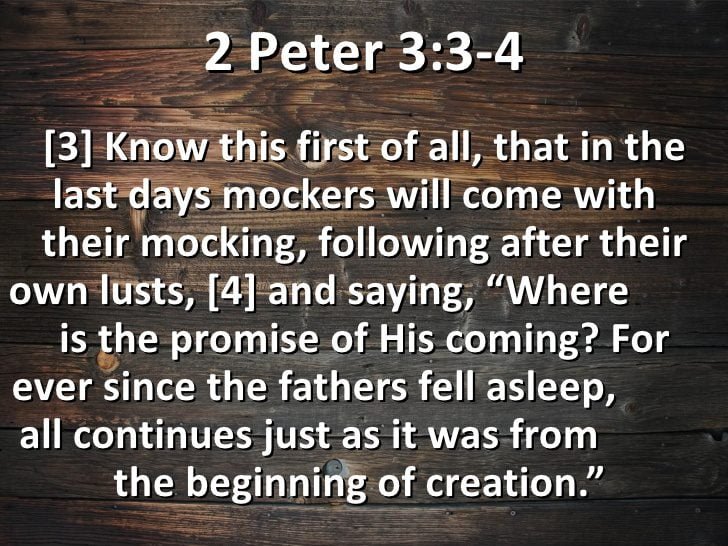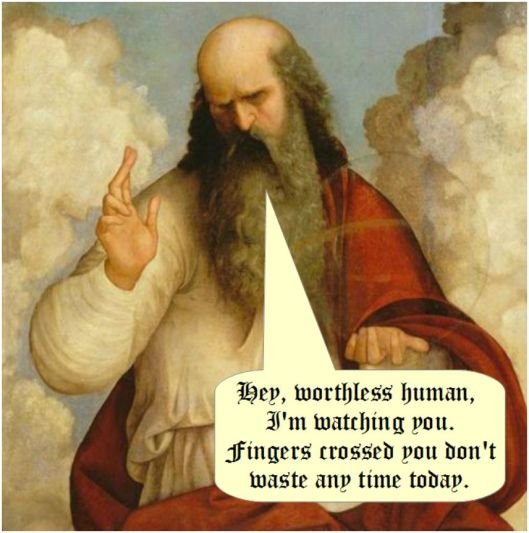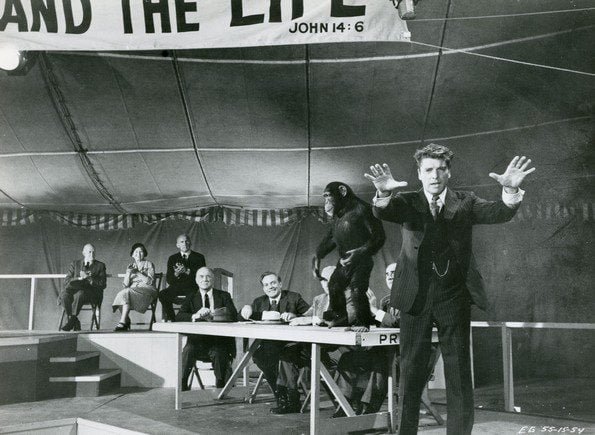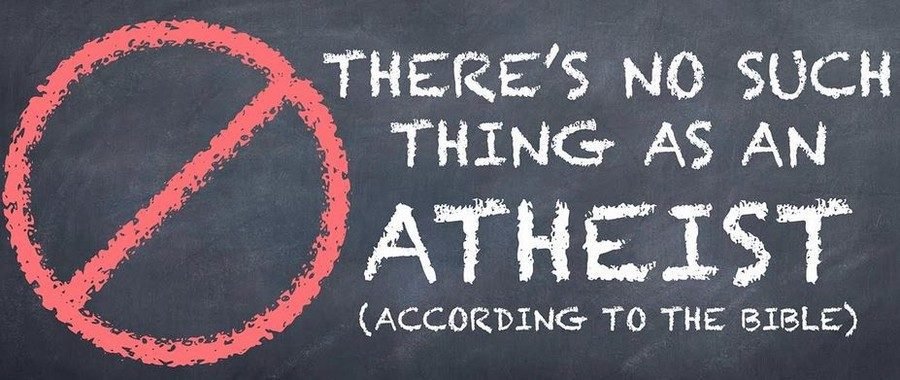
According to the dictionary, a scoffer is one who ridicules or mocks someone or something. My Evangelical critics think I am a scoffer, one who mocks or ridicules God/Jesus/Bible/Christianity. Am a really guilty as charged?
Knowing this first, that there shall come in the last days scoffers, walking after their own lusts, And saying, Where is the promise of his coming? for since the fathers fell asleep, all things continue as they were from the beginning of the creation. For this they willingly are ignorant of, that by the word of God the heavens were of old, and the earth standing out of the water and in the water . . .
How that they [the apostles] told you there should be mockers in the last time, who should walk after their own ungodly lusts.
Most Evangelicals believe we presently live in the “last days”; a period of moral decline and a falling away from Christianity prior to the Rapture or Second Coming of Jesus. (Yes, I am well aware of the various eschatological interpretations of the phrase “last days.”) Most Evangelicals believe that the return of Jesus Christian is right around the corner; that all the “bad” things happening in the world (Matthew 24:1-13) today are signs pointing to the imminent return of Jesus (and slaughter of everyone on earth except for Christians).
According to Bible, scoffers are people who mock and ridicule the One True Faith®; ungodly people who walk in their own lusts (desiring that which is contrary to God and the Bible); people who deny Jesus is coming to earth again.
Wes McAdams, the preaching minister at the Church of Christ on McDermott Rd in Plano, Texas, recently published a post titled The Danger of Becoming a Scoffer.
McAdams stated:
The word, “scoff” means to make fun of or mock. Scoffing is treating someone, or their ideas, as stupid or silly. So, a scoffer is a person who habitually laughs at, mocks, and makes fun of others. When a scoffer encounters an idea he doesn’t understand or agree with, his typical reaction is to laugh scornfully.
Being a scoffer reflects an arrogant spirit. “‘Scoffer’ is the name of the arrogant, haughty man who acts with arrogant pride” (Proverbs 21:24). Constantly seeing others as stupid and their ideas as ridiculous is a sure sign of a proud and arrogant heart.
Scoffers tend to have a lot in common with cynics. Meaning, they scoff not just at ideas, but also at the perceived motives of their opponents. A scoffer might even scoff at his opponents on issues where they would seem to agree. The scoffer will laugh and say, “You don’t really believe that. You’re just trying to fool and manipulate people.” The scoffer prides himself on his distrust and skepticism.
There may be an appropriate occasion to scoff, but it’s never appropriate to be a scoffer. If scoffing has become a pattern in your life, you may need to ask yourself if this is you.
….
The problem with warning people about being scoffers is that scoffers don’t listen. They scoff at warnings, correction, and rebuke. This may be why the Bible says more about scoffers than it says to them:
“Whoever corrects a scoffer gets himself abuse, and he who reproves a wicked man incurs injury. Do not reprove a scoffer, or he will hate you; reprove a wise man, and he will love you.”
“A scoffer does not like to be reproved; he will not go to the wise.”
“Blessed is the man who walks not in the counsel of the wicked, nor stands in the way of sinners, nor sits in the seat of scoffers; but his delight is in the law of the Lord, and on his law he meditates day and night.”
The danger of becoming a scoffer is not only that you are treating people in an unloving way, but that you are being an unteachable person. So, if you find yourself drifting in this direction, turn back now.
I suspect McAdams’ target audience is Christians, not atheists. That said, McAdams believes scoffers tend to be cynical, distrustful, and skeptical; implying that these are bad character traits to have. I searched McAdams’ website, looking for statements he’s made about atheists or atheism. Here’s what I found:
Likewise, we must prepare our children and grandchildren so that they can properly defend Christianity against the attacks made upon it by its enemies. From the philosopher who claims it is impossible to know anything at all, to the scientist who claims that we are little more than “naked apes,” attacks upon Christianity are never-ending. The atheist says he knows God doesn’t exist, the agnostic says neither he nor anyone else can know God exists, the skeptic says he doubts that God exists, the infidel says that if God exists, it is not the God of the Bible, and so on. Various forms of these false philosophies have crept into the church in some places, and have caused the untaught and the unstable to fall away. Children are especially vulnerable to such false teachings, as often they are required to study under teachers or professors who openly are antagonistic to Christianity. A young person’s plastic, impressionable mind is a prime target for the devil’s ungodly schemes. It is our responsibility to fill the minds of our children with truth (and evidence for that truth) so they will be able to withstand the “fiery darts of the evil one” (Eph. 6:16). It has been said that a child’s mind is like Jell-O®—and that our job is to fill with all the “good stuff” before it “sets.” A study of the evidences supporting Christianity is a fine step in the right direction toward protecting both our children and the future of the church. (An excerpt from an article by Brad Harrub)
Today’s conversation is different than other conversations on this podcast. I typically have conversations on the show with Christians “about life and faith,” but today’s conversation is with my friend Brad Willett, who is not a Christian. In fact, Brad does not believe in God at all. He and I have been talking via email and social media for a couple of years and though we have a very different worldview and disagree with one another on fundamental questions, I am thankful to know him.
In this conversation, Brad and I discussed how he became an atheist and some of his interactions with Christians since he stopped believing in God. We also discussed some of the myths Christians believe about atheists and how Christians can do a better job having conversations with their atheist, agnostic, and skeptical neighbors. I hope this conversation is beneficial to everyone who hears it. (Talking to an Atheist — a discussion between McAdams and an atheist)
Recently, when young atheists were “asked to cite key influences in their conversion to atheism,” they didn’t talk about conferences they attended or books they had read; instead, they made “vague references to videos they had watched on YouTube or website forums.” I think that is incredibly interesting! The internet is helping convert people to atheism. Not because the atheists have the most compelling arguments (obviously they don’t), but because the atheists are harnessing the power of the internet to get their agenda out there. (Why Churches of Christ are at a Pivotal Moment in History)
Even the supposed facts that skeptics and atheists throw out to undermine the Christian faith, are based on assumptions. Naturalistic scientists, for example, approach and present their research with unfounded assumptions. (Losing Faith: 4 Things to Do When Doubts Arise)
Atheists and agnostics deserve to go to hell. Jews, Muslims, and Hindus deserve to go to hell. People in every denominational church deserve to go to hell. And, YES, even New Testament Christians (i.e. members of churches of Christ) deserve to go to hell. We all deserve to be condemned! We have all already committed, “damnable offenses.” All of us have!
Jesus Christ is the only solution to that problem. Becoming His disciple and hiding ourselves in Him is the only way we will escape eternal condemnation (Romans 8:1). (If You Don’t Believe Like I Do, Will You Go to Hell?)
While McAdams paints himself as a charitable person (and I have no doubt he is), lurking behind his charity are Evangelical Church of Christ beliefs, including the belief that non-Christians will spend eternity in Hell (it’s hard to be friends with someone who believes you will burn in Hell for refusing to be a Christian). Further, McAdams’ website is littered with tired, worn-out apologetical arguments for the existence of the Christian God and the veracity of Christianity.
As I perused McAdams writing, I came across this statement about atheists and agnostics:
The atheist says, “Reason, logic, and science prove God does not exist.” The agnostic says, “It cannot be proven whether God exists or not, therefore no one can ever really know.” And these two groups look condescendingly at the Christian, as the Christian simply says, “I have faith in God’s existence.”
McAdams says that atheists and agnostics “look condescendingly at the Christian, as the Christian simply says, I have faith in God’s existence.” Thus, I suspect McAdams thinks many atheists and agnostics are scoffers.
Now to the title of this post, Bruce, the Scoffer. Evangelicals read my writing and conclude that I am personally ridiculing or mocking them. Nothing could be further from the truth. How is an Evangelical-turned-atheist telling his story mockery or ridicule of individual Christians? This says far more about the collective persecution complex of Evangelicals than it does me.
I am more than happy to engage Evangelicals in thoughtful discussions about my story, the existence of God, the central claims of Christianity, the nature and historicity of the Bible, etc. However, MOST Evangelicals who contact me (totaling thousands of contact points over the past fourteen years) have no interest in “thoughtful discussions.” Instead, with fangs bared, they attack me, often going to great lengths to smear my character. These followers of Christ threaten me with Hell, warning that I will face untold torture for eternity if I don’t repent. Their emails and comments have made the front page of this site numerous times. It is these behaviors I mock and ridicule.
Let me conclude this post by returning to McAdams’s claim that scoffers tend to be cynical, distrustful, and skeptical. Am I cynical? Yep. Distrustful and skeptical? Yep, and yep. And I make no apology for being so. After spending fifty years in the Christian church and twenty-five years as an Evangelical pastor, I have every reason to be cynical, distrustful, and skeptical. Throw in my experiences with former colleagues in the ministry and Evangelical zealots, is it any wonder I look at Christianity the way I do? Forget my arguments against the claims of Christianity. Just look at the behavior of Evangelicals — especially in the age of Donald Trump. Where is Jesus? Where can one find people who love God and love their neighbors as themselves? It is this Christianity that deserves nothing but scorn, ridicule, and disgust. There’s a reason Evangelicalism is one of the most hated religious sects in America — and Evangelicals need only look in the mirror to see who is to blame.
Bruce Gerencser, 68, lives in rural Northwest Ohio with his wife of 47 years. He and his wife have six grown children and sixteen grandchildren. Bruce pastored Evangelical churches for twenty-five years in Ohio, Texas, and Michigan. Bruce left the ministry in 2005, and in 2008 he left Christianity. Bruce is now a humanist and an atheist.
Your comments are welcome and appreciated. All first-time comments are moderated. Please read the commenting rules before commenting.
You can email Bruce via the Contact Form.









